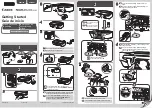
12 Encryption and Digital Signature Settings
348
E
n
cr
y
p
tion a
nd Digit
a
l S
igna
tur
e Se
tt
ings
12
Encryption and Digital Signature Overview
Types of Certificate
To use the Encryption feature and the Signature feature on the machine, a certificate
is required.
The following two types of device certificate can be used on the machine:
z
A Self-signed certificate created by CentreWare Internet Services (valid for one year)
z
A certificate issued by another CA
When you use a certificate issued by another CA, import the certificate using
CentreWare Internet Services.
For more information on how to import a certificate, refer to the help of CentreWare Internet Services.
O: Available
U
: Set as necessary X: Not available
*: Available when [IKE Authentication Method] is set to [Authenticate by Digital Signature].
Encryption Features for Communication
The data sent between the machine and computers on a network can be encrypted.
Encrypting HTTP Communications from a Client to the Machine
(SSL/TLS Server)
The SOAP, Internet Services (HTTP), IPP, and WebDAV ports use the HTTP server of
the machine.
The SSL/TLS protocol is used to encrypt the HTTP communications between a client
and the machine.
To encrypt communications, either one of the device certificate is required: a self-
signed certificate or a certificate issued by another CA.
Note
•
By encrypting HTTP communications, communications data can be encrypted at the time of
printing using IPP (SSL encrypted communications).
Types of Certificate
Types of Encryption
Self-Signed
Certificate
Certificate
Issued by
Another CA
Encrypting HTTP communications
from a client to the machine
(SSL/TLS server)
O
O
Encrypting HTTP communications
from the machine to a remote server
(SSL/TLS client)
X
O
Encryption using IPSec
X
U
*
E-mail encryption/digital signature
X
O
PDF signature/DocuWorks
signature/XPS signature
O
O
















































